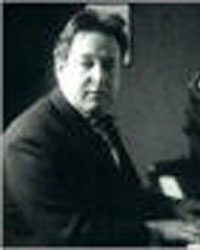Renowned as a child prodigy and composer of Hollywood film scores, Korngold’s stage and concert music languished in obscurity for years thanks to the trend away from romanticism and towards intellectual complexity in twentieth century music, but is now being ‘rediscovered’ with a vengeance. Born in Brno (Moravia, now the Czech Republic), Korngold was the son of the music critic Julius Korngold, whose hostility to the Second Viennese School surely influenced the the career of his son. He composed from a young age in a densely chromatic language. That he was a prodigy is borne witness to by the testimonies of Mahler (who declared him a genius and sent him to study with Zemlinksy) , Felix Weingartner and Richard Strauss. His two-act ballet-pantomime Der Schneeman was staged at the Hofoper in Vienna in the presence of the Emperor Franz Josef when he was 11 and by the time he was 23, he had already written two one-act operas and Die Tode Stadt (the most famous of his operas) was being premièred simultaneously in Hamburg and Cologne. Korngold married in 1924 and in order to earn money accepted several commissions to re-orchestrate and arrange some of the classics of the operetta repertoire, including Strauss’s Eine Nacht in Venedig and Die Fledermaus, with considerable success. The other aspect of his work that upset the critics was his move into Hollywood films, which began when the producer-director Max Reinhardt brought him to America to supervise the music in the film of a staged production of A Midsummer Night’s Dream (for which Korngold had written the incidental music).. Korngold became very successful in this field, winning Academy Awards in 1936 and 1938 for Anthony Adverse and The Adventures of Robin Hood and made several more trips to Hollywood - when the Nazis marched into Austria, he remained there and did not return to Europe until 1949. On returning, he found the musical climate changed and the critics almost uniformly hostile to his music. His last work was the Symphony in F sharp major, about which he wrote, "I believe that my newly completed symphony will show the world that atonality and ugly dissonance and the price of giving up inspiration, form, expression, melody and beauty will result in ultimate disaster for the art of music." Words that might well have served as Korngold’s epitaph.. |
|
|
|
|
Erich Korngold - Composer Information
Search our Library
Featured Composers
Counterpoint Music Library Services
Copyright © 2012 All Rights Reserved
Copyright © 2012 All Rights Reserved
Created by Wavelength Media

